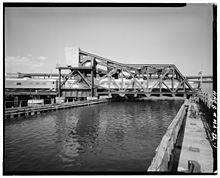Charles River Bridge (Commuter Rail)
| Charles River Bridge | |
|---|---|

Charles River Bridge in closed position with a train
|
|
| Coordinates | 42°22′08″N 71°03′55″W / 42.36898°N 71.06529°WCoordinates: 42°22′08″N 71°03′55″W / 42.36898°N 71.06529°W |
| Carries | rail traffic over 4 tracks, split between the two bridges |
| Crosses | Charles River |
| Locale | Boston, Massachusetts |
| Characteristics | |
| Design | single-leaf, through-truss, rolling bascule bridge |
| Material | steel |
| Total length | 92 feet (28 m) (±5 feet (1.5 m)) |
| No. of spans | 1 |
| Piers in water | 0 |
| History | |
| Designer | Keller & Harrington, Chicago |
| Opened | 1931 |
The Charles River Bridge is a pair of railroad single-leaf, through-truss, rolling bascule bridges across the Charles River that connects North Station in Boston, Massachusetts to MBTA Commuter Rail lines in northern Massachusetts.
Although rail bridges across the Charles River near the present location of North Station have existed since the Boston and Lowell Railroad opened in 1835, the current bridges date from 1931, when the navigable channel of the Charles River was shifted 300 feet to the north of its former route to allow the platforms at North Station to be extended northwards. The bridges were formerly connected to North Station by a wooden trestle; the trestle burned in January 1984, forcing all trains to terminate at a temporary station north of the river for 15 months.
These bridges were designed by Keller & Harrington of Chicago, Illinois and built by the Phoenix Bridge Company of Phoenixville, Pennsylvania. Each bridge uses a 629-short-ton (571 t) over-head concrete counterweight. Originally, there were four bridges, but only two of them remain.
...
Wikipedia

